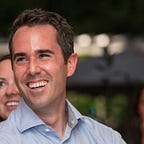Mind the GONGOs: How Government Organized NGOs Troll Europe’s Largest Human Rights Conference
By: Daniel B. Baer
For two weeks in September, governments and human rights defenders gather in Warsaw for Europe’s largest human rights conference, the OSCE’s Human Dimension Implementation Meeting. HDIM is a unique forum — an opportunity for civil society to sit at the table with governments to discuss where we’re making progress and where we’re falling short on meeting our shared commitments to protect and respect human rights and fundamental freedoms.
Increasingly, that conversation is being polluted by GONGOs — Government Organized Non-Governmental Organizations. “Why would a government organize a “fake” community organization or human rights advocacy group?” you ask. Well, repressive regimes have found that because they are often unable to convincingly answer the criticism voiced by citizens who join to form bona fide civil society organizations, they can set up their own fake organizations that will shill for the government in an attempt to distract from repressive failings. GONGOs defend countries’ policies, attempt to delegitimize genuine civil society voices, and consume time, space, and other limited resources that could be used for real, meaningful dialogue.
Sometimes people might confuse GONGOs for real NGOs, but most of the time they’re pretty easy to detect. Their real impact is diluting the quality of the conversation and raising the cost of facilitating genuine dialogue. A few examples:
• In formal plenary sessions, speaking time is allotted based on the number of countries and organizations that sign up on the Speaker’s List. By flooding HDIM plenary sessions with GONGOs, the amount of time given to real civil society organizations is reduced.
• GONGOs often deliver their points in the same passionate tone and tenor as the genuine civil society organizations they seek to imitate, but behind their performance of commitment are false and absurd claims. This aims to reduce the impact and resonance of the compelling, fact-based testimonials shared by groups and organizations being repressed by their governments.
• “Side events” — these are workshops and panel discussions hosted by governments and civil society on topics of interest — and many of us see them as the best feature of HDIM. They’re meant to create less formal opportunities to exchange views than the formal plenary sessions. Space for “side events” at the conference venue is very limited, and increasingly we see GONGOs booking side event rooms solely to prevent others from having a space to hold their own events.
• At side events hosted by bona fide civil society organizations, states sometimes dispatch their GONGOs to intimidate human rights defenders by sending a “big brother” message that brave advocates’ words and actions are being monitored and reported back to their capitals. GONGOs also frequently abuse question-and-answer periods to make lengthy, aggressive, and often loud statements in support of their governments’ views, again eating up time and space for dialogue.
• Speaking of eating, at many events, GONGO participants arrival early, consume all of the food and drink, and leave before the real conversation starts. In doing so, they raise the cost of providing refreshments intended for legitimate, interested participants — no small matter when an NGO is footing the bill.
• GONGOs masquerading as bona fide civil society organizations frequently team up with repressive governments’ state-controlled media. This synergy of fake news and fake advocates helps repressive regimes create the theatrical illusions they use in support of efforts to justify their grasp on power. Eh voila! The newscasts back home in Repressia or Autocrastan only show the GONGOs singing their government’s praises and criticizing others.
Simply put, GONGOs are nothing more than the real-world equivalent of the internet troll armies that insecure, authoritarian, repressive regimes have unleashed on Twitter. They use essentially the same tactics as their online counterparts – creating noise and confusion, flooding the space, using vulgarity, intimidating those with dissenting views, and crowding out legitimate voices.
The good news is that they’re also just as lame as their online counterparts. As one ambassador from a European country said to me last week, “Don’t those governments know how stupid they look when they bring along these stooges?”
Some might say that these challenges mean that civil society organizations registering for HDIM should be screened — but that would be a trap. One of HDIM’s best features is that any registered civil society organization or NGO can raise its concerns in the presence of some 1,300 diplomats, international experts, and human rights defenders from 57 countries. Many of these journalists, non-governmental organizations, minority groups, human rights advocates, and even non-partisan polling organizations face pressure, violence, intimidation, and arrest for standing up for our shared principles — principles that all 57 countries have pledged to protect.
Instead, as an OSCE community, we need to raise awareness of GONGOs, identify and expose them for what they are, call out their lies and deceptions, and make clear that they make their governments look weak and insecure. At the same time, we need to stand up for genuine civil society organizations, encourage their active participation in plenary sessions, support their side-events, and ensure that the courageous human rights defenders that have been the life force of the Helsinki Process for decades are not squeezed out by GONGO trolls.
In doing so, we can foil the feeble attempt of GONGOs and their pathetic government sponsors to hijack Europe’s largest human rights conference, and ensure that the Human Dimension Implementation Meeting remains a vibrant forum for dialogue between government and civil society.
About the author: Daniel B. Baer serves as U.S. Permanent Representative to the Organization for Security and Cooperation in Europe.
